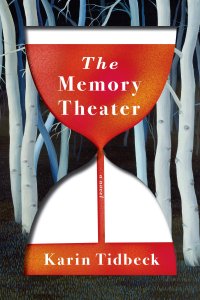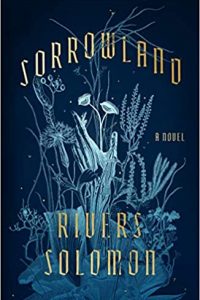Gary K. Wolfe Reviews The Memory Theater by Karin Tidbeck
 The Memory Theater, Karin Tidbeck (Pantheon 978-1-5247-4833-3, $25.95, 240pp, hc) February 2021.
The Memory Theater, Karin Tidbeck (Pantheon 978-1-5247-4833-3, $25.95, 240pp, hc) February 2021.
One of the more memorable figures in Karin Tidbeck’s Crawford Award-winning collection Jagganath was the title character of the story “Augusta Prime”, an epically supercilious aristocrat whose idea of entertainment was to smash her croquet ball into the face of an attending page. Augusta lived in a kind of polder (in the John Clute sense), a garden in which a group of immortals preserved themselves from the outside world and from the passage of time, and Tidbeck’s new novel The Memory Theater opens in that same space – called simply The Gardens – and the Lady Augusta is once again wielding that croquet mallet. Turns out she’s a lot worse than we thought. A supremely self-satisfied and arrogant torturer, murderer, and occasional cannibal, she terrorizes the servants in the Gardens and, briefly, in our own world, where she has a creepy ability to bend people to her will.
I mention that earlier story, which originally dates from 2009, not because it’s in any way necessary to appreciate The Memory Theater (it’s not), but because one signature feature of Tidbeck’s fiction has been her skill at implying entire worlds made of complex interactions between reality and consciousness – or perhaps more specifically, between reality and the attention we pay to it. In another story, “Aunts”, set in the same world, we’re told that in some places “unless someone claims time to pass, it might not, or it does so only partly,” which is pretty much the situation in The Gardens. In Tidbeck’s novel Amatka, everyday objects like luggage or toothbrushes have to be reminded of what they are, lest they start to lose form. The peripatetic troupe that provides The Memory Theater its title claims to perform true stories in order to “write them into the book of the universe” so that the event “will always have happened.” Telling stories and naming things are what make up the fabric of Tidbeck’s worlds, and not surprisingly, much the same might be said of the folklore, fairy tales, and myths that constantly seem to lurk in the background.
The Memory Theater opens with Dora and Thistle, two young servants of the lords and ladies who live in the eternal twilight world of The Gardens, reliving the same parties, games, and hunts in a kind of Groundhog Day loop that seems just dandy to them. Lady Augusta is able to keep Thistle in her service because she has kept his true name from him, and Thistle acts as a brother to Dora because her father, the Lord Walpurgis, has no idea how to be a parent. When a mysteriously powerful figure named Ghorbi shows up, she not only shows the kids a path to escape, but causes Augusta herself to be banished into exile. Soon Thistle’s quest to find his true name brings him and Dora into contact with the Memory Theater, a magical troupe that travels between worlds and performs before no audiences, simply weaving its stories into the fabric of time. Meanwhile, Augusta finds herself in WWII-era Uppsala, where she begins blithely murdering anyone who gets in her way or, for that matter, simply fails to sustain her interest. She learns of a figure named Phantasos, who described himself as lord of the Gardens, and becomes obsessed with tracking him down in hopes of returning home.
Needless to say, these two major plotlines begin to converge and overlap in a kind of elegant tapestry that recalls the Memory Theater’s own sense of a story-made world. As always, the clarity and grace of Tidbeck’s prose is remarkable, and her skill at keeping her plot galloping along despite peppering us with provocative ideas and tantalizing mysteries is equally impressive. I’m not sure I’d describe this in terms of a concept as blunt as world-building, but Tidbeck is a master of world-implying, of suggesting that a good part of what she has to say takes place beyond the edges of the page. In a few strokes, we know all we need to about The Gardens or about a Sweden threatened by Hitler, but those worlds that the Memory Theater wanders around in remain a source of mystery and wonder. It’s no spoiler to note that the last line of dialogue in the novel is “tell me a story,” because this whole remarkable novel is about the power of that sentence.
Gary K. Wolfe is Emeritus Professor of Humanities at Roosevelt University and a reviewer for Locus magazine since 1991. His reviews have been collected in Soundings (BSFA Award 2006; Hugo nominee), Bearings (Hugo nominee 2011), and Sightings (2011), and his Evaporating Genres: Essays on Fantastic Literature (Wesleyan) received the Locus Award in 2012. Earlier books include The Known and the Unknown: The Iconography of Science Fiction (Eaton Award, 1981), Harlan Ellison: The Edge of Forever (with Ellen Weil, 2002), and David Lindsay (1982). For the Library of America, he edited American Science Fiction: Nine Classic Novels of the 1950s in 2012, with a similar set for the 1960s forthcoming. He has received the Pilgrim Award from the Science Fiction Research Association, the Distinguished Scholarship Award from the International Association for the Fantastic in the Arts, and a Special World Fantasy Award for criticism. His 24-lecture series How Great Science Fiction Works appeared from The Great Courses in 2016. He has received six Hugo nominations, two for his reviews collections and four for The Coode Street Podcast, which he has co-hosted with Jonathan Strahan for more than 300 episodes. He lives in Chicago.
This review and more like it in the May 2021 issue of Locus.
 While you are here, please take a moment to support Locus with a one-time or recurring donation. We rely on reader donations to keep the magazine and site going, and would like to keep the site paywall free, but WE NEED YOUR FINANCIAL SUPPORT to continue quality coverage of the science fiction and fantasy field.
While you are here, please take a moment to support Locus with a one-time or recurring donation. We rely on reader donations to keep the magazine and site going, and would like to keep the site paywall free, but WE NEED YOUR FINANCIAL SUPPORT to continue quality coverage of the science fiction and fantasy field.
©Locus Magazine. Copyrighted material may not be republished without permission of LSFF.






